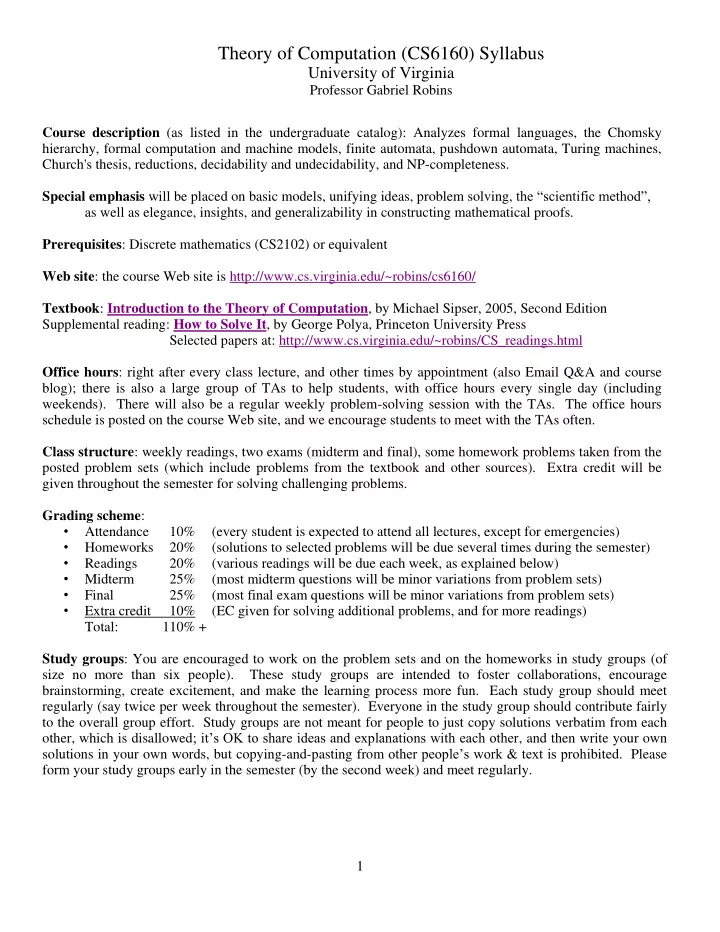

Theory of Computation (CS6160) Syllabus University of Virginia Professor Gabriel Robins Course description (as listed in the undergraduate catalog): Analyzes formal languages, the Chomsky hierarchy, formal computation and machine models, finite automata, pushdown automata, Turing machines, Church's thesis, reductions, decidability and undecidability, and NP-completeness. Special emphasis will be placed on basic models, unifying ideas, problem solving, the “scientific method”, as well as elegance, insights, and generalizability in constructing mathematical proofs. Prerequisites : Discrete mathematics (CS2102) or equivalent Web site : the course Web site is http://www.cs.virginia.edu/~robins/cs6160/ Textbook : Introduction to the Theory of Computation , by Michael Sipser, 2005, Second Edition Supplemental reading: How to Solve It , by George Polya, Princeton University Press Selected papers at: http://www.cs.virginia.edu/~robins/CS_readings.html Office hours : right after every class lecture, and other times by appointment (also Email Q&A and course blog); there is also a large group of TAs to help students, with office hours every single day (including weekends). There will also be a regular weekly problem-solving session with the TAs. The office hours schedule is posted on the course Web site, and we encourage students to meet with the TAs often. Class structure : weekly readings, two exams (midterm and final), some homework problems taken from the posted problem sets (which include problems from the textbook and other sources). Extra credit will be given throughout the semester for solving challenging problems. Grading scheme : • Attendance 10% (every student is expected to attend all lectures, except for emergencies) • Homeworks 20% (solutions to selected problems will be due several times during the semester) • Readings 20% (various readings will be due each week, as explained below) • Midterm 25% (most midterm questions will be minor variations from problem sets) • Final 25% (most final exam questions will be minor variations from problem sets) • Extra credit 10% (EC given for solving additional problems, and for more readings) Total: 110% + Study groups : You are encouraged to work on the problem sets and on the homeworks in study groups (of size no more than six people). These study groups are intended to foster collaborations, encourage brainstorming, create excitement, and make the learning process more fun. Each study group should meet regularly (say twice per week throughout the semester). Everyone in the study group should contribute fairly to the overall group effort. Study groups are not meant for people to just copy solutions verbatim from each other, which is disallowed ; it’s OK to share ideas and explanations with each other , and then write your own solutions in your own words, but copying-and-pasting from other people’s work & text is prohi bited. Please form your study groups early in the semester (by the second week) and meet regularly. 1
Weekly readings : The weekly readings in this class consist of a minimum total of 36 items from the recommended readings list at http://www.cs.virginia.edu/~robins/CS_readings.html consisting of various papers, videos, animated demos, Web sites, and books. The required ones are highlighted in red font there, while the rest are "electives". The readings item types should constitute a diverse mix, with a minimum of at least 15 videos, at least 15 papers / Web sites, and at least 6 books. Any items above 36 will count towards extra-credit. The minimum writeup requirements for these readings are a 2 paragraph description for each paper / video / Web site, and 2 page description for books (longer writeups are of course welcomed also). Each writeup should summarize what you learned and what you found interesting and/or surprising. At least two submissions are due each week (by 11:59pm on Monday, beginning the week after the first class), with no late submissions accepted, and more than two submissions per week are of course very welcomed and highly recommended. However, no more than two submissions per day are allowed (if more than two submissions per day occur, only the first two will be credited). This policy will be strictly enforced, and is designed to help you avoid "cramming" at the end of the semester, and also to help you retain more of the knowledge by pacing it more evenly over time. “Cramming” and procrastination are also highly correlated with cheating, so failure to consistently submit these weekly readings on time will attract higher scrutiny to you with respect to cheating detection. Please use the course readings submissions Web form for all submissions. Milestones in Computability and Logic: Advanced undecidability: • Axiomaic systems • Context -free intersections • Principia Mathematica • Post correspondence problem • Godel’s Incompleteness Theorem • Linear -bounded automata • The Turing / Church thesis • Turing reducibilities • Dovetailing / diagonalization • Computational universality • The infinity hierarchy • Conway’s Game of Life • Independence of the axioms • Busy beaver problem • Hilbert’s Tenth Pro blem • The recursion theorem • Information Theory • Oracles and relativizations • Self -reproduction • Non -recognizability • Formal languages • Turing degrees • Complexity theory • Randomness, compressibility, and entropy • Completeness theory • Quaternions and Surreal numbers Advanced complexity theory: • Time and space complexity classes • Complexity hierarchies / separations Beyond the Chomsky hierarchy: • Review of the Chomsky hierarchy • Denseness and gap theorems • Two -way finite automata • Axiomatic complexity • Generalized finite automata • NP -completeness reloaded • State set min imization • Problem reductions • Left/right linear grammars • Graph colorability • Infinite automata • Set cov er problem • Nondeterminism and alternation • Knapsacks and subset sums • Deterministic context -free languages • Bounded approximation • Counter automata and languages • Savitch’s Theorem • Ambiguity in grammars and languages • PSPACE completeness • Grammar parsing • NL completeness • Context -sensitive grammar • Approximation algorithms • The Turing test • Zero -knowledge proofs • Mental poker 2
Recommend
More recommend